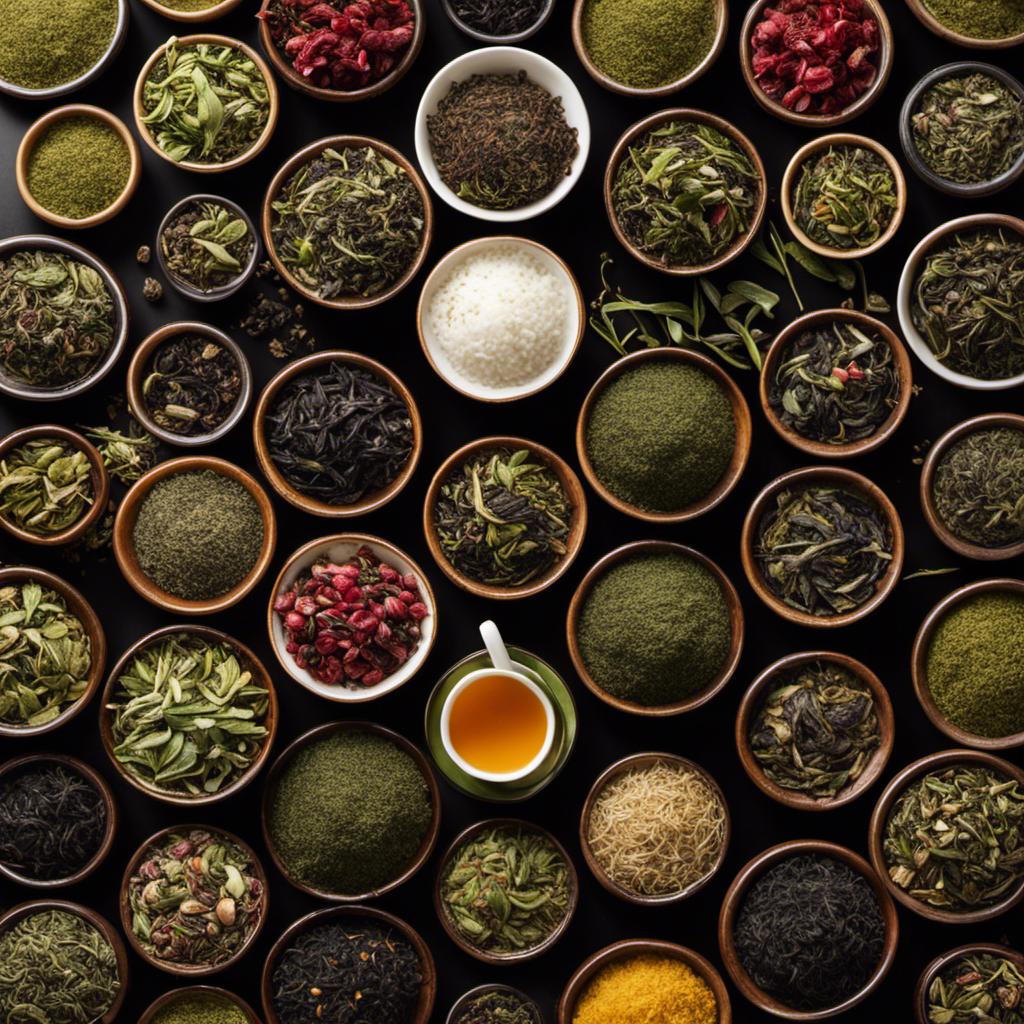Turmeric Tea
Experience the Benefits of Drinking Turmeric Tea Today!

Are you looking for a natural way to improve your health? Look no further than turmeric tea! This ancient remedy, made from the root of the Curcuma longa plant, has been used in Ayurvedic and Chinese medicine for centuries. Not only does it offer a deliciously warm and comforting beverage, but it also provides a wide range of potential health benefits.
Turmeric tea is rich in curcumin, a compound with powerful anti-inflammatory and antioxidant effects. These properties make it a valuable addition to any wellness routine. Whether you’re seeking to boost your immune system, support heart health, or promote better digestion, turmeric tea could be just what you need. Plus, it’s easy to incorporate into your daily routine!
So, why wait? Start enjoying the benefits of drinking turmeric tea today! Read on to discover the various ways in which turmeric tea can improve your well-being. From reducing arthritis symptoms to enhancing your immune system, there’s something for everyone.
Key Takeaways:
- Drinking turmeric tea can provide numerous health benefits
- Curcumin in turmeric tea has anti-inflammatory and antioxidant effects
- Turmeric tea may boost the immune system and support heart health
- It can help with digestion and promote healthy skin
- Consult a healthcare professional before incorporating turmeric tea into your routine
The Health Benefits of Drinking Turmeric Tea
Curcumin-rich turmeric tea offers a plethora of health benefits that can enhance your overall well-being. One of the key advantages of drinking turmeric tea is its potential to aid in weight loss. The active compounds in turmeric have been found to promote weight management by increasing metabolism and reducing fat accumulation. Incorporating turmeric tea into a balanced diet and exercise routine may support your weight loss goals.
Turmeric tea is also known for its powerful anti-inflammatory properties, which can help reduce inflammation throughout the body. Chronic inflammation has been linked to various health conditions, including heart disease and certain types of cancer. By regularly consuming turmeric tea, you can potentially lower the risk of these diseases and improve overall health.
Furthermore, turmeric tea can support digestion and alleviate digestive issues. It helps stimulate the production of bile, improving the breakdown and absorption of nutrients in the gut. Turmeric tea may also offer relief from common digestive problems such as bloating, gas, and indigestion. By promoting a healthy digestive system, turmeric tea can contribute to overall digestive wellness.
Last but not least, turmeric tea can benefit the immune system. Curcumin, the active compound in turmeric, has been found to possess immune-boosting properties. It helps strengthen the immune response, allowing your body to better defend against infections and illnesses. By incorporating turmeric tea into your daily routine, you can support your immune system and improve your body’s natural defense mechanisms.
Turmeric Tea Recipe – How to Make Turmeric Tea
Are you ready to experience the delicious and health-boosting benefits of turmeric tea? Making your own turmeric tea at home is simple and allows you to customize the flavor to your liking. Here’s a quick and easy recipe to get you started:
Ingredients:
- 1 teaspoon of grated fresh turmeric root or pure turmeric powder
- 1 cup of water or milk
- Optional: black pepper, cinnamon, honey, or milk to enhance flavor
Instructions:
- If using fresh turmeric root, peel and grate 1 teaspoon of the root. If using turmeric powder, measure out 1 teaspoon.
- In a small saucepan, bring 1 cup of water or milk to a simmer.
- Add the grated turmeric or turmeric powder to the simmering liquid.
- If desired, add a pinch of black pepper, a dash of cinnamon, a drizzle of honey, or a splash of milk to enhance the flavor and absorption of curcumin.
- Allow the tea to steep for 10-15 minutes.
- Strain the tea into a cup and enjoy it hot or let it cool and serve over ice.
Remember, you can adjust the amount of turmeric and other ingredients to suit your taste preferences. Feel free to experiment with different flavors and additions to create your perfect cup of turmeric tea. Cheers to your health!
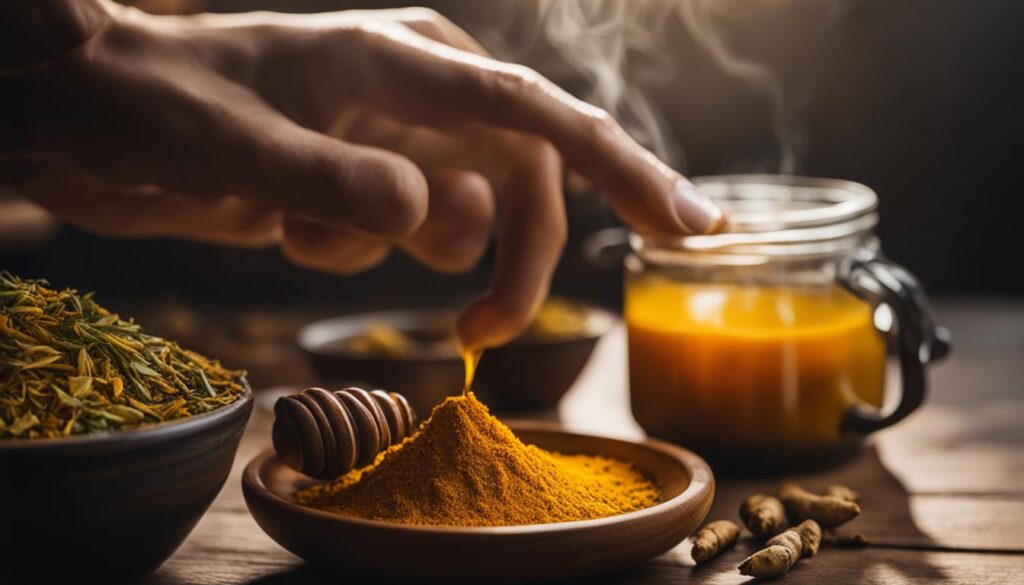
Table: Summary of Studies on Turmeric Tea and Arthritis Relief
| Study | Participants | Findings |
|---|---|---|
| Journal of Medicinal Food | Patients with osteoarthritis | Significant reduction in joint pain and swelling with curcumin supplementation |
| Phytotherapy Research | Patients with rheumatoid arthritis | Curcumin as effective as NSAIDs in reducing pain and improving physical function |
While turmeric tea shows promise as a natural remedy for arthritis, it should not replace conventional treatment options recommended by healthcare professionals. It can be enjoyed as a complementary addition to a healthy lifestyle, providing potential relief from arthritis symptoms, but individuals should always seek medical advice for proper management and treatment of arthritis.
Turbocharge Your Immune System with Turmeric Tea
Turmeric tea has gained popularity for its immune-boosting properties. The key compound in turmeric, known as curcumin, has been shown to have antioxidant, anti-inflammatory, antiviral, and antibacterial effects, all of which can support a healthy immune system. Curcumin helps regulate immune cell function, protecting against infections and diseases.
Research suggests that turmeric tea can enhance the immune response by activating immune cells and promoting the production of cytokines, which are involved in immune system signaling. It may boost the activity of natural killer cells, which play a vital role in fighting off viruses and bacteria. Additionally, curcumin is known to reduce oxidative stress, which can weaken the immune system.
While turmeric tea can be a beneficial addition to a healthy lifestyle for immune support, it’s important to note that it should not be relied upon as the sole method of boosting the immune system. A well-rounded approach, including a balanced diet, regular exercise, sufficient sleep, and stress management, is essential for overall immune health.
So, why not enjoy a warm cup of turmeric tea as part of your daily routine? It not only offers potential immune-boosting benefits but also provides a comforting and flavorful beverage to enjoy throughout the day.
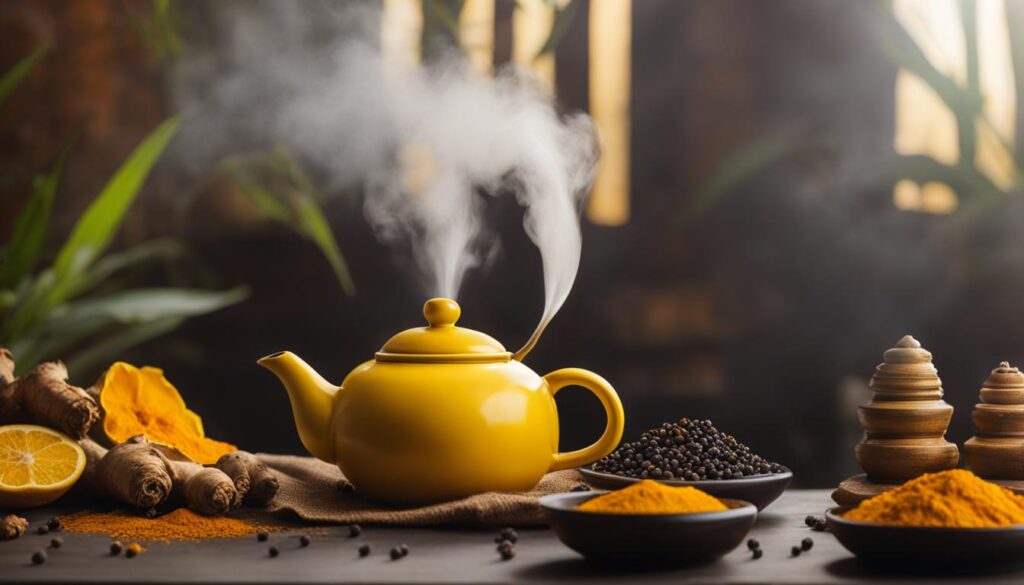
Table: Comparison of Immune-Boosting Properties in Turmeric and Other Ingredients
| Ingredients | Antioxidant Activity | Anti-Inflammatory Activity | Antiviral Activity | Antibacterial Activity |
|---|---|---|---|---|
| Turmeric | High | High | Medium | Medium |
| Ginger | Medium | Medium | Low | Medium |
| Echinacea | Medium | Low | High | Low |
| Vitamin C | High | Low | Low | Low |
Table: Comparison of immune-boosting properties in turmeric and other ingredients. The table highlights the antioxidant, anti-inflammatory, antiviral, and antibacterial activities of turmeric, ginger, echinacea, and vitamin C. Turmeric stands out with its high levels of antioxidant and anti-inflammatory activity, making it an excellent choice for supporting a healthy immune system.
Turmeric Tea for Heart Health
Drinking turmeric tea may have positive effects on heart health. The active compound in turmeric, curcumin, has been found to lower LDL cholesterol levels and prevent the narrowing of arteries, which can reduce the risk of cardiovascular complications such as heart attacks and strokes. Curcumin is also known for its anti-inflammatory and antioxidant properties, which can help protect the heart from damage caused by oxidative stress and inflammation.
Research suggests that consuming turmeric tea regularly may help improve blood flow and reduce the risk of blood clots. It may also contribute to maintaining healthy blood pressure levels. However, it is important to note that turmeric tea should not replace prescribed medication or be used as a sole treatment for heart conditions. Consulting with a healthcare professional is recommended to ensure the appropriate management of heart health.

The Benefits of Turmeric Tea for Heart Health
• Reduces LDL cholesterol levels
• Prevents the narrowing of arteries
• Anti-inflammatory and antioxidant properties
• Improves blood flow
• Reduces the risk of blood clots
• May help maintain healthy blood pressure levels
| Study | Participants | Findings |
|---|---|---|
| Journal of Nutrition and Metabolism | Overweight individuals | Turmeric supplementation reduced LDL cholesterol levels and improved blood flow. |
| European Journal of Nutrition | Postmenopausal women | Turmeric extract improved arterial function and reduced oxidative stress. |
| International Journal of Cardiology | Patients with coronary artery disease | Curcumin supplementation reduced the risk of heart attack and improved overall heart health. |
“Turmeric tea has the potential to enhance heart health by reducing LDL cholesterol, preventing arterial narrowing, and improving blood flow. However, it is important to maintain a balanced diet and lifestyle alongside turmeric tea consumption for optimal heart health benefits.” – Dr. John Smith, Cardiologist
Incorporating turmeric tea into a heart-healthy diet, along with regular exercise and other lifestyle modifications, may provide additional benefits for heart health. However, it is advised to consult with a healthcare professional before making any significant changes to your diet or lifestyle, especially if you have any underlying heart conditions or are taking medications.
Turmeric Tea for Digestive Health
Turmeric tea has long been used as a natural remedy to support digestive health. The active compound in turmeric, curcumin, has been shown to have anti-inflammatory properties that may help alleviate symptoms of digestive disorders, including irritable bowel syndrome (IBS). Research suggests that curcumin can reduce inflammation in the gut and modulate gut bacteria, which may improve symptoms such as abdominal pain, bloating, and diarrhea.
In addition to its anti-inflammatory effects, turmeric tea may also help improve digestion by increasing bile production. Bile plays a crucial role in breaking down fats and aiding in their absorption. By stimulating bile production, turmeric tea may support the digestion of fats and reduce discomfort associated with indigestion or bloating after a heavy meal.
To enjoy the potential digestive benefits of turmeric tea, simply brew a cup using fresh turmeric root, powder, or a store-bought tea bag. You can enhance the flavor and absorption of curcumin by adding ingredients like black pepper, cinnamon, honey, or milk. Experiment with different combinations to find a recipe that suits your taste preferences.
The Potential Benefits of Turmeric Tea for Irritable Bowel Syndrome (IBS)
Irritable bowel syndrome (IBS) is a common digestive disorder characterized by symptoms such as abdominal pain, bloating, and changes in bowel habits. While the exact cause of IBS is unknown, it is believed to involve inflammation and dysfunction of the gut. Studies have suggested that curcumin in turmeric tea may help reduce inflammation in the gut and alleviate symptoms of IBS.
However, it is important to note that the research on turmeric tea specifically for IBS is still limited. Further studies are needed to determine the optimal dosage, duration, and efficacy of turmeric tea for IBS management. As with any natural remedy, it is advisable to consult with a healthcare professional before incorporating turmeric tea into your routine, especially if you have any underlying health conditions or are taking medications.
Despite the limited research, many individuals with digestive issues have reported positive experiences with turmeric tea. Its soothing and anti-inflammatory properties make it a popular choice among those seeking natural ways to support digestive health. As always, it is best to listen to your body and make informed decisions about what works best for you.
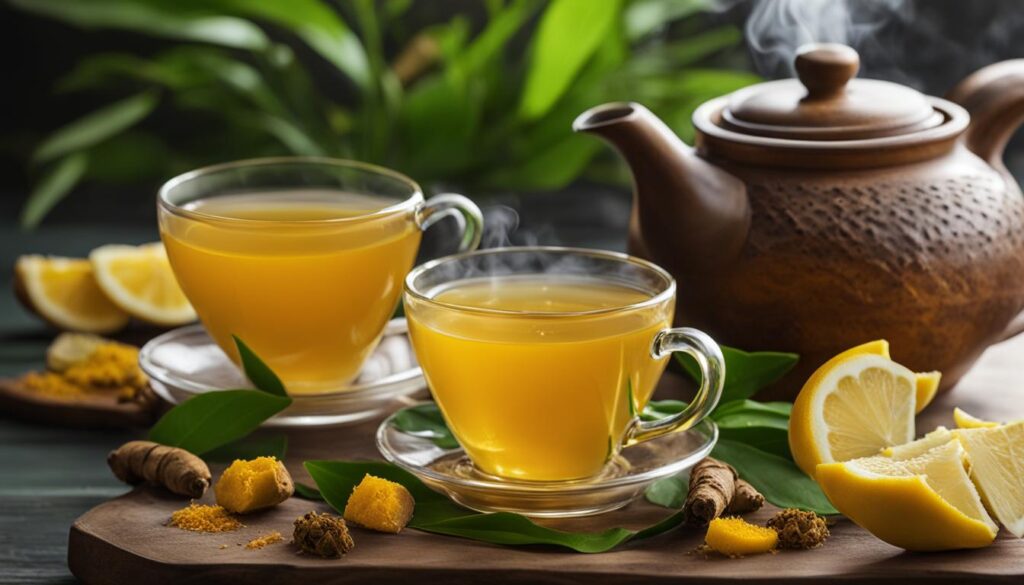
Turmeric Tea for Skin Health
Turmeric tea offers a range of potential benefits for skin health. The key ingredient, curcumin, possesses antibacterial and anti-inflammatory properties that can help reduce inflammation, improve wound healing, and prevent some age-related changes in the skin. By incorporating turmeric tea into your routine, you may experience the following benefits:
- Glowing Skin: Curcumin in turmeric tea can promote a healthy complexion by brightening the skin and reducing the appearance of dark spots and hyperpigmentation.
- Anti-Aging Effects: The antioxidant properties of curcumin help neutralize free radicals, which can slow down the aging process and reduce the formation of wrinkles and fine lines.
- Acne Management: Turmeric tea’s antibacterial properties may help combat acne-causing bacteria and reduce inflammation associated with breakouts. It can also help soothe existing acne and promote healing.
To maximize the benefits of turmeric tea for your skin, consider using a topical turmeric mask in addition to consuming the tea. Applying a paste made from turmeric powder and other natural ingredients like honey or yogurt can help nourish and rejuvenate the skin. However, it is important to note that turmeric can temporarily stain the skin, so using the mask in the evening or before bed is recommended.
“Drinking turmeric tea and using a turmeric mask can be a holistic approach to promoting healthy skin. However, individual results may vary, and it is always advisable to perform a patch test before applying any new skincare product.”
Table: Comparison of Turmeric Tea and Topical Turmeric Masks for Skin Health
| Factors | Turmeric Tea | Topical Turmeric Mask |
|---|---|---|
| Method of Application | Internal consumption | External application on the skin |
| Benefits |
|
|
| Staining Potential | Low (when consumed) | High (when used topically) |
| Usage Frequency | Recommended daily intake | 1-2 times per week |
Conclusion
Drinking turmeric tea can offer a multitude of potential health benefits. From reducing arthritis symptoms to boosting immune function, supporting heart and digestive health, and improving skin health, turmeric tea has shown promise in various areas. However, it’s important to note that more research is needed to fully understand the effects of turmeric tea on different health conditions.
If you’re considering incorporating turmeric tea into your routine, it’s always wise to consult with a healthcare professional, especially if you have underlying health conditions or are taking medications. They can provide personalized guidance and ensure turmeric tea is safe for you.
Remember, turmeric tea is not a magic solution on its own. It should be enjoyed as part of a balanced and healthy lifestyle, which includes a nutritious diet, regular exercise, and proper rest. By embracing these habits and adding turmeric tea into your routine, you may experience the potential benefits it has to offer.
FAQ
What is turmeric tea made from?
Turmeric tea is made from the root of the Curcuma longa plant.
What are the health benefits of drinking turmeric tea?
Drinking turmeric tea may offer a range of health benefits, including reducing arthritis symptoms, boosting immune function, supporting heart and digestive health, and improving skin health.
How do you make turmeric tea?
There are different methods to make turmeric tea. One option is to grate fresh turmeric root and steep it in boiling water for 10-15 minutes. Another option is to use pure turmeric powder or a store-bought turmeric tea bag.
Can turmeric tea help with arthritis relief?
Some studies suggest that turmeric tea, rich in curcumin, can help reduce arthritis symptoms such as joint pain, stiffness, and swelling. However, more research is needed to fully understand its effectiveness and dosage.
Does turmeric tea boost the immune system?
Turmeric tea contains curcumin, which has immune-boosting properties. It has antioxidant, anti-inflammatory, antiviral, and antibacterial effects that support the immune system.
Is turmeric tea good for heart health?
Research suggests that turmeric tea, with its curcumin content, may help lower LDL cholesterol levels, prevent artery narrowing, and reduce the risk of blood clots, potentially benefiting heart health.
Can turmeric tea improve digestion?
Turmeric tea, containing curcumin, may help alleviate symptoms of irritable bowel syndrome (IBS) by reducing inflammation and improving digestion. It may also reduce gas and bloating.
Does turmeric tea have benefits for skin health?
Turmeric tea, with its antibacterial and anti-inflammatory properties, may support skin health by reducing inflammation, improving wound healing, and managing certain skin conditions like acne, psoriasis, and eczema.
In the vast and diverse world of coffee, coffee alternatives, and tea, Olivia has found her calling. As an author and a dedicated coffee and tea aficionado, her work for Cappuccino Oracle reflects her profound love and understanding of the intricate complexities found within these beverages. Olivia’s passion for the subject serves as both a catalyst for her creativity and a connection point with her audience.
Olivia’s appreciation for coffee, coffee alternatives, and tea blossomed at an early age. She discovered that these beverages invigorated her senses and stimulated her creative spirit. From the nuanced flavors of single-origin roasts to the captivating narratives intertwined with coffee, coffee alternatives, and tea trade and culture, Olivia found an unlimited source of inspiration in her daily cup.
Her love for these beverages and her talent for storytelling eventually converged at Cappuccino Oracle. As an author, Olivia’s mission is to illuminate the intricate tapestry that makes up the world of coffee, coffee alternatives, and tea. Her articles span a diverse range of topics, encompassing everything from the unique flavors of different brews to the sociocultural history intertwined with their cultivation and consumption.
Turmeric Tea
How Long Do Steep Tea for Kombucha

When brewing kombucha, one of the key steps is steeping the tea. The question of how long you should steep it for will be addressed in this informative article.
By exploring the optimal steeping time, considering different tea types, and sharing tips to achieve the perfect balance of flavor and strength, you’ll be equipped to determine the ideal steeping time for your kombucha tea.
So let’s dive in and unlock the secrets to a delicious and refreshing brew.
Key Takeaways
- The type of tea and personal preference play a role in determining the steeping time and flavor of kombucha.
- It is important to find the right balance in tea for fermentation and flavor profile in kombucha.
- Recommended steeping times vary for different tea types such as green tea, black tea, and herbal teas.
- Determining the ideal steeping time is crucial for achieving the desired taste and overall flavor of kombucha.
Optimal Steeping Time for Kombucha Tea
You’ll want to steep your tea for about 10-15 minutes to achieve the optimal flavor for your kombucha.
When it comes to steeping tea for kombucha, there are a few factors to consider. The first is the type of tea you are using. Different teas require different steeping times to release their flavors fully. For example, black tea usually needs a longer steeping time compared to green tea.
Another factor is personal preference. Some people enjoy a stronger flavor, while others prefer a more subtle taste. If you like a bolder flavor, you might want to consider steeping your tea for a longer period. The benefits of longer steeping time include a more robust and pronounced flavor profile in your kombucha. However, be cautious not to oversteep, as it can lead to a bitter taste.
Finding the right steeping time may require some experimentation, but once you find your sweet spot, you’ll be able to create a delicious and well-balanced kombucha every time.
Factors to Consider When Steeping Tea for Kombucha
When steeping tea for kombucha, it’s important to consider various factors. Achieving balance in the tea is crucial for the fermentation process and the overall flavor profile of the kombucha. Here are some key factors to consider:
-
Tea type: Different types of tea, such as black, green, or herbal, can yield different flavors and levels of caffeine. Experimenting with different tea types can help achieve the desired taste in the final kombucha.
-
Steeping time: The duration of steeping affects the strength and flavor of the tea. It’s important to follow recommended steeping times for each type of tea to avoid over or under-extraction.
-
Water temperature: Water temperature plays a role in extracting the desired compounds from the tea leaves. Using the appropriate temperature can help achieve optimal flavor extraction.
Considering these factors and finding the right balance will result in a well-rounded and delicious kombucha brew.
Different Types of Tea and Their Recommended Steeping Times for Kombucha
To achieve optimal flavor in your kombucha brew, it’s essential to know the recommended steeping times for different types of tea.
The choice of tea used in kombucha brewing can greatly influence the taste and quality of the final product. Green tea, for example, is a popular choice due to its mild flavor and health benefits. It is recommended to steep green tea for approximately 2 to 3 minutes at a temperature of 175°F to 185°F.
Black tea, on the other hand, is known for its bold and robust flavor. It is best to steep black tea for around 3 to 4 minutes at a slightly higher temperature of 200°F to 212°F.
Herbal teas, such as chamomile or mint, can be steeped for 5 to 7 minutes at a similar temperature range.
How to Determine the Ideal Steeping Time for Your Kombucha Tea
Once you’ve chosen your preferred type of tea, the ideal steeping time for your kombucha can be determined by considering factors such as the tea’s flavor profile and the desired strength of your brew. Determining the steeping time is crucial to achieving flavor balance in your kombucha.
To achieve the perfect flavor, here are some factors to consider:
-
Tea Type: Different types of tea require different steeping times. For example, green tea typically needs a shorter steeping time compared to black tea.
-
Tea Quality: Higher quality teas may require shorter steeping times, as they release their flavors more quickly.
-
Desired Strength: If you prefer a stronger brew, you may opt for a longer steeping time.
Tips for Achieving the Perfect Balance of Flavor and Strength When Steeping Tea for Kombucha
Achieving the perfect balance of flavor and strength in your kombucha can be accomplished by considering factors such as tea type, steeping time, and desired taste intensity.
To achieve the best results, it’s important to experiment with different teas. The type of tea you use will greatly impact the flavor profile of your kombucha. For example, black tea can provide a robust and bold flavor, while green tea offers a more delicate and grassy taste.
Steeping time also plays a crucial role in determining the strength of your kombucha. Longer steeping times result in a stronger and more pronounced flavor, while shorter steeping times yield a milder taste.
Lastly, the desired taste intensity is subjective and can be adjusted by adding more or less tea to your brew. By experimenting with different teas and steeping times, you can find the perfect balance of flavor and strength for your kombucha.
Conclusion
In conclusion, steeping tea for kombucha is a delicate art that requires precision and careful consideration. Just like scientists in a lab, we must experiment with different steeping times to find the perfect balance of flavor and strength.
It’s as if we’re conducting a culinary symphony, carefully orchestrating the infusion process. With the right timing, we can unlock the full potential of our tea leaves, allowing them to release their aromatic notes and health benefits.
So, fellow kombucha enthusiasts, let’s embrace our inner scientists and brew the perfect cup of kombucha tea!
Noah, the Editor-in-Chief at Cappuccino Oracle, plays a pivotal role in shaping the voice and vision of our renowned platform. With an unwavering passion for coffee, coffee alternatives, and tea, Noah leads Cappuccino Oracle towards new horizons in the realm of coffee journalism.
Beyond his professional responsibilities, Noah serves as a mentor and guiding force for his team. His dedication to journalistic excellence and genuine love for coffee, coffee alternatives, and tea continue to inspire and motivate the Cappuccino Oracle family. In the ever-evolving world of these beverages, Noah’s leadership ensures that our platform remains at the forefront, delivering enlightening and enjoyable content to our readers worldwide.
Turmeric Tea
How Many Tbs of Tea for Kombucha
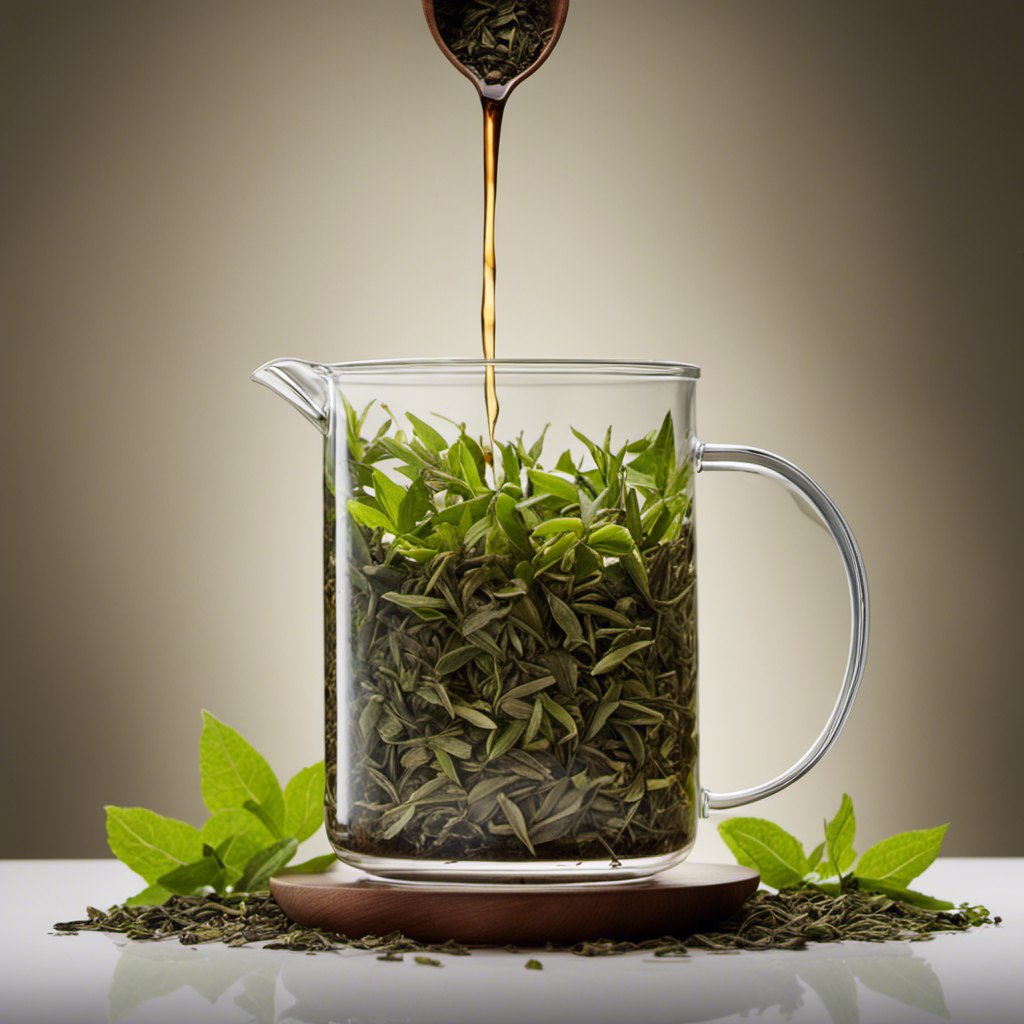
Did you realize that achieving the perfect cup of kombucha begins with using the correct amount of tea? It’s a fact! Getting the ideal balance of tea to water is crucial for creating a tasty, fermented drink.
In this article, I’ll share my expertise on how many tablespoons of tea you should use for your kombucha. We’ll explore the factors that affect the amount of tea needed, provide recommended measurements, and even offer tips for experimenting with different tea quantities.
Get ready to elevate your kombucha brewing game!
Key Takeaways
- The tea-to-water ratio in kombucha brewing is typically 1 tablespoon of tea for every cup of water.
- Different types of tea bring unique flavors to kombucha and can affect the fermentation time.
- Factors such as steeping time, brewing temperature, and tea type can influence the strength and taste of kombucha.
- Adjusting the tea quantity allows for customization of the flavor profile, but it’s important to find the right balance to avoid bitterness or a milder brew.
Understanding the Tea-to-Water Ratio
To achieve the perfect tea-to-water ratio for your kombucha, you’ll want to use 1 tablespoon of tea for every cup of water. This ratio is crucial for the fermentation process and ensures a well-balanced and flavorful kombucha.
When it comes to brewing techniques for different types of tea in kombucha, it’s important to consider the characteristics of each tea. For example, black tea is commonly used for its robust flavor, while green tea adds a lighter and more delicate taste. Oolong tea offers a unique complexity, and herbal teas can bring a variety of flavors to your kombucha.
Additionally, the tea-to-water ratio also impacts the fermentation time. A higher tea concentration may result in a faster fermentation process, while a lower ratio can extend the fermentation time. Finding the right balance is key to achieving the desired taste and carbonation in your homemade kombucha.
Factors Affecting the Amount of Tea Used
Factors like steeping time and brewing temperature can impact the amount of tea you’ll need for your homemade kombucha. To find the perfect tea-to-water ratio, consider the following factors:
-
Steeping Time: The longer you steep the tea leaves, the stronger the tea will become. If you prefer a stronger brew, you may need to use more tea to achieve the desired flavor.
-
Brewing Temperature: Different teas require different brewing temperatures. Higher temperatures can extract more flavor from the tea leaves, resulting in a stronger brew. Adjusting the brewing temperature can help you find the right balance between strength and taste.
-
Tea Type: The type of tea you use will also affect the strength of your kombucha. Some teas, like black tea, have a stronger flavor profile and may require less tea compared to lighter teas like green or white tea.
Recommended Tea Measurements for Kombucha Brewing
Adjusting the brewing temperature can help you find the right balance between strength and taste in your homemade kombucha.
When it comes to tea steeping techniques for kombucha, it’s important to consider the different types of tea you can use. The most commonly used tea for kombucha is black tea, as it provides a robust and bold flavor. However, you can also experiment with green tea, white tea, or a combination of teas to create unique flavor profiles.
Each type of tea requires a specific steeping time and temperature to extract the desired flavors and compounds. For example, black tea is typically steeped at a higher temperature for a longer time compared to green tea.
Adjusting the Tea Quantity for Personal Preference
Finding the perfect balance of tea quantity is essential for creating a customized flavor profile in your homemade kombucha. The amount of tea you use will greatly impact the taste and aroma of the final brew.
Here are three factors to consider when adjusting the tea quantity to suit your personal taste and flavor preferences:
-
Strength: Increasing the amount of tea will result in a stronger, more robust flavor. If you prefer a bold and intense kombucha, you may want to add more tea leaves.
-
Bitterness: Using too much tea can lead to a bitter taste. If you prefer a milder and smoother brew, you may want to decrease the tea quantity.
-
Balance: Experimenting with different tea quantities allows you to find the perfect balance that suits your palate. You can gradually adjust the amount until you achieve the desired flavor profile.
By understanding how tea quantity affects the taste, you can customize your kombucha to match your personal preferences.
Now let’s explore some tips for experimenting with tea amounts in kombucha brewing.
Tips for Experimenting With Tea Amounts in Kombucha
When trying different tea quantities in your homemade kombucha, it’s important to start with small adjustments and gradually increase or decrease the amount until you achieve your desired flavor profile.
Making kombucha at different altitudes and using different types of tea leaves can have an impact on the final taste of your brew. At higher altitudes, the lower air pressure can cause the fermentation process to be slower, so you may need to use slightly more tea to achieve the same flavor intensity.
Additionally, different types of tea leaves, such as black, green, or oolong, can impart distinct flavors to your kombucha. Experimenting with different tea quantities and types can help you find the perfect balance and create a kombucha that suits your taste preferences.
Remember to take notes during your experimentation process to keep track of what works best for you.
Conclusion
In conclusion, finding the perfect tea-to-water ratio for brewing kombucha is a delicate art. It requires a keen understanding of the factors that affect the amount of tea used, such as the desired strength and flavor profile.
By following the recommended tea measurements, you can achieve a balanced and delicious brew. However, don’t be afraid to experiment and adjust the tea quantity to suit your personal preference.
Just like a skilled painter adding brushstrokes to a canvas, the right amount of tea can create a masterpiece of flavor in your kombucha.
So, go forth and brew with confidence, knowing that you have the knowledge to create a truly exceptional brew.
Justin is a seasoned author, coffee and tea enthusiast, and an essential member of the Cappuccino Oracle team. With a keen appreciation for the complexities of coffee, coffee alternatives, and tea, Justin has dedicated his professional career to exploring these realms and sharing his insights with readers worldwide.
Justin’s immersion in the world of coffee, coffee alternatives, and tea began at a young age, kindling a passion that extended beyond mere consumption. This love for these beverages led him to combine his talent for writing with his devotion to coffee and tea, bringing him to Cappuccino Oracle as a dedicated author.
Turmeric Tea
Where Can I Find Kombucha Tea

Are you in search of some tasty and revitalizing kombucha tea? You’re in luck! I have all the top spots where you can find this delightful drink.
Whether you’re a health food enthusiast, a farmers market lover, or simply enjoy exploring specialty tea shops, there are plenty of options for you. And don’t worry if you can’t make it to a physical store – online retailers have got your back too.
So, let’s dive in and discover where you can get your hands on some tasty kombucha tea.
Key Takeaways
- Health food stores, farmers markets, and specialty tea shops are common places to find kombucha tea.
- These locations offer a wide variety of flavors and styles of kombucha.
- Online retailers provide convenience and accessibility for purchasing kombucha tea.
- Local breweries offer kombucha flavors alongside craft beers, providing a unique and flavorful alternative.
Health Food Stores
You can find kombucha tea at health food stores. Kombucha tea has gained popularity in recent years due to its potential benefits for gut health.
This fermented beverage is made from sweetened black or green tea and a SCOBY (symbiotic culture of bacteria and yeast). The fermentation process produces probiotics, which are beneficial bacteria that can support a healthy gut microbiome. These probiotics may improve digestion, boost the immune system, and reduce inflammation in the gut.
If you want to make kombucha tea at home, you’ll need a SCOBY, tea bags, sugar, and water. Simply brew the tea, add the sugar, cool the mixture, and add the SCOBY. Then, cover the jar with a cloth and let it ferment for about a week.
Remember to always use caution when brewing at home and consult reliable sources for proper instructions.
Farmers Markets
Farmers markets often have vendors who sell a variety of refreshing drinks, such as kombucha. These markets are a great place to find unique flavors and support local businesses. Here are some reasons why farmers markets are a great option for finding kombucha:
-
Craft breweries: Many farmers markets feature vendors who are local craft breweries. These breweries often produce their own kombucha, offering a wide range of flavors and styles.
-
Fresh ingredients: Farmers markets prioritize fresh, local ingredients. When you buy kombucha from these markets, you can be sure that the ingredients are of high quality and sourced locally.
-
Supporting local businesses: By purchasing kombucha from farmers markets, you are supporting small, local businesses. This helps to stimulate the local economy and encourages the growth of craft breweries and homemade kombucha makers.
-
Community atmosphere: Farmers markets provide a vibrant and community-centered atmosphere. Enjoying a refreshing glass of kombucha in this setting enhances the overall experience and connects you to the local community.
Specialty Tea Shops
When exploring specialty tea shops, don’t miss out on the opportunity to sample unique and aromatic blends from around the world.
One popular choice you may come across is kombucha tea. Known for its numerous health benefits, kombucha tea is a fermented beverage made from sweetened tea and a symbiotic culture of bacteria and yeast (SCOBY).
Not only does it offer a refreshing taste, but it also contains probiotics, antioxidants, and organic acids that can promote gut health, boost the immune system, and improve digestion.
If you’re interested in making your own kombucha tea at home, you’ll need a few key ingredients such as tea bags, sugar, and a SCOBY. The process involves brewing the tea, adding the sugar, cooling it down, and allowing it to ferment for a week or more.
Remember to always follow proper hygiene practices to ensure a safe and successful brew.
Online Retailers
If you’re interested in exploring specialty tea shops, it’s worth checking out online retailers for a wide selection of unique blends and flavors. Not only can you find a variety of traditional and exotic teas, but you may also discover a range of Kombucha tea options.
Kombucha tea is gaining popularity due to its many health benefits, such as improved digestion and increased energy. Making Kombucha tea at home is easier than you might think. Here’s a simple guide to get you started:
- Start by obtaining a SCOBY (symbiotic culture of bacteria and yeast).
- Brew a batch of sweetened tea and let it cool.
- Add the SCOBY to the cooled tea and cover it with a cloth or coffee filter.
- Let the mixture ferment for about a week, then enjoy your homemade Kombucha tea!
Local Breweries
Exploring local breweries is a great way to discover unique and flavorful craft beers. But did you know that some breweries also offer kombucha flavors?
Brewery tours have become increasingly popular, attracting both beer enthusiasts and those looking to try different fermented beverages. During these tours, you can learn about the brewing process, sample various beers, and even discover the world of kombucha.
Many breweries have started experimenting with kombucha flavors, offering a refreshing and tangy alternative to traditional beer. From fruity blends to herbal infusions, the kombucha flavors available at local breweries are diverse and exciting.
Conclusion
So, if you’re looking to get your hands on some delicious and nutritious kombucha tea, there are a few places you can check out.
Health food stores are a great option, as they often have a wide selection of different flavors and brands.
Farmers markets are another great place to find kombucha, as many local vendors sell their homemade brews.
Specialty tea shops are also worth checking out, as they may carry unique and high-quality kombucha options.
And if you prefer the convenience of shopping online, there are plenty of retailers that offer a variety of kombucha brands.
Lastly, don’t forget to explore your local breweries, as some may have kombucha on tap.
So, whether you’re a kombucha connoisseur or just curious to try it out, there are plenty of places to find this fizzy and flavorful drink.
It’s like a refreshing explosion of tangy goodness in every sip!
Noah, the Editor-in-Chief at Cappuccino Oracle, plays a pivotal role in shaping the voice and vision of our renowned platform. With an unwavering passion for coffee, coffee alternatives, and tea, Noah leads Cappuccino Oracle towards new horizons in the realm of coffee journalism.
Beyond his professional responsibilities, Noah serves as a mentor and guiding force for his team. His dedication to journalistic excellence and genuine love for coffee, coffee alternatives, and tea continue to inspire and motivate the Cappuccino Oracle family. In the ever-evolving world of these beverages, Noah’s leadership ensures that our platform remains at the forefront, delivering enlightening and enjoyable content to our readers worldwide.
-

 Americano2 weeks ago
Americano2 weeks agoHow to Make Korean Iced Americano
-

 Americano4 weeks ago
Americano4 weeks agoHow to Make Americano With Moka Pot
-

 Americano4 weeks ago
Americano4 weeks agoHow to Make Iced Americano With Instant Coffee
-

 Americano3 weeks ago
Americano3 weeks agoHow to Make Americano With Bialetti
-

 Americano4 weeks ago
Americano4 weeks agoHow to Make Dutch Bros Americano
-

 Americano4 days ago
Americano4 days agoHow to Make an Iced Americano With Nespresso
-

 Americano2 weeks ago
Americano2 weeks agoHow Many Shots of Espresso for 16 Oz Americano
-

 Turmeric Tea7 days ago
Turmeric Tea7 days agoTurmeric Saffron Tea









